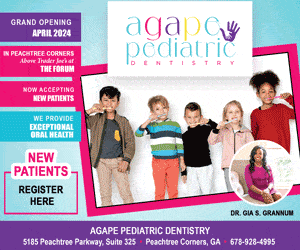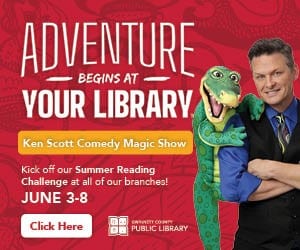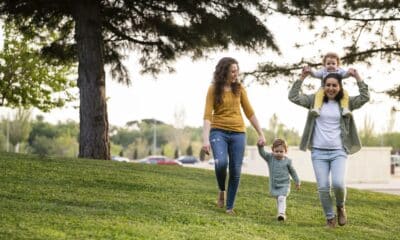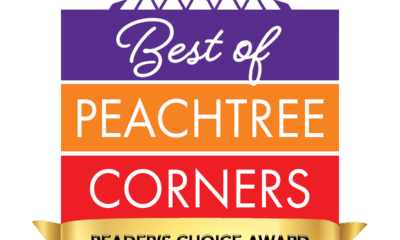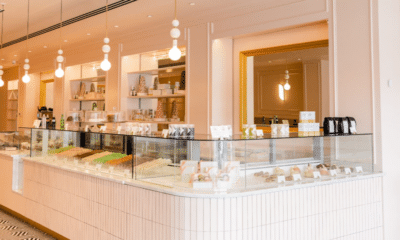Community
Rabbi Yossi Lerman, talking about Chabad of Gwinnett, Community Outreach and his New Book [Podcast]
Published
4 years agoon
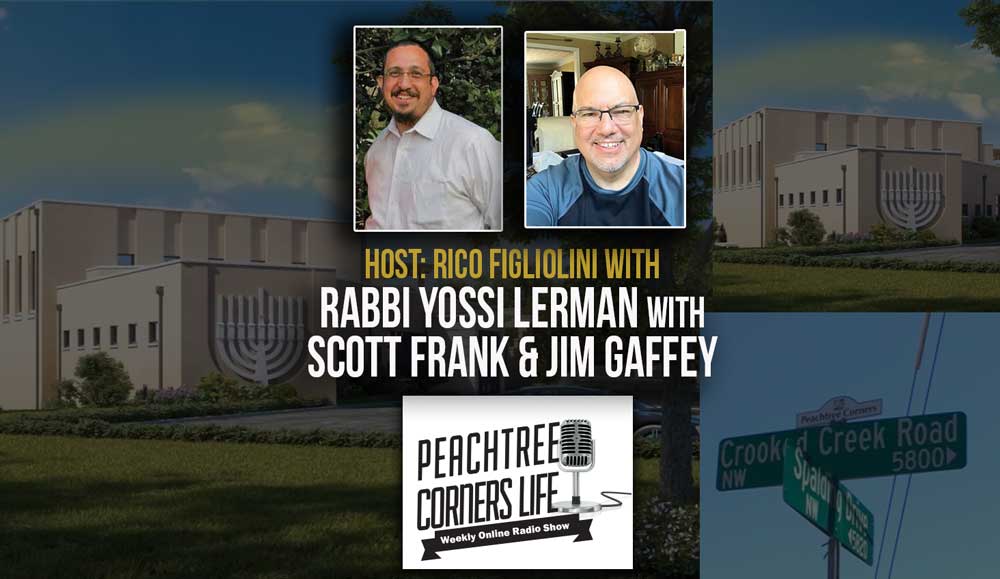
Rabbi Yossi Lerman and co-author of “Less Stress, More Joy,” with co-author Scott Frank and Jim Gaffey, President of the Men’s Club Outreach of Mary Our Queen Catholic Church, all joined Rico Figliolini to discuss Chabad of Gwinnett, their philosophy, outreach, their planned Chabad Enrichment Center in Peachtree Corners.
Recorded at Atlanta Tech Park, in City of Peachtree Corners, Georgia
Resources:
Chabad Website: www.ChabadOfGwinnett.org
Rabbi Yossi’s Phone: (678) 595-0196
Mary Our Queen Website: https://maryourqueen.com
Jim Gaffey’s Phone: (770) 364-6359 Buy their book:
Podcast Transcript
Rico: [00:00:30] Hi everyone. This is Rico Figliolini host of Peachtree Corners Life and publisher of Peachtree Corners Magazine. I appreciate you guys joining us and we have a special guest today. But before we get to that, I just want to acknowledge our sponsor here at Atlanta Tech Park in the City of Peachtree Corners, we’re in that podcast studio, Atlanta Tech Park is an accelerator, huge place. Lots of startups and mid size companies ready to be pushed out of the nest. And they’re doing a lot of high tech stuff here. This actually sits on Curiosity Lab at Peachtree Corners, which is a stretch road about a mile and a half. That is an autonomous vehicle track that’s alive, living track. The mobile, IOT type technology companies can come here and experiment in life environment to see how their equipment, software and such works. So just a great opportunity to be in a great place in the city of Peachtree Corners. Now to get to my guest today, my guest today is Rabbi Yossi Lehrman. Thank you, Rabbi for coming. Rabbi Yossi Lierman is head of the Chabad of Gwinnett. And, we’re going to be discussing a little bit about that, the philosophy and the outreach. Scott Frank also is chairman of the building committee for Chabad of Gwinnett. They’re creating a Chabad enrichment center. So it’s, it’s a piece that’s going to be, like many of our faith institutions providing a lot of good outreach and, and good places here in Peachtree Corners. And Jim Gaffey, who is president of the men’s club at the Mary Our Queen Church. Jim, thanks for being here.
Jim: [00:02:05] Thank you Rico.
Rico: [00:02:06] Good community support from local church?
Jim: [00:02:08] That’s correct.
Rico: [00:02:09] Excellent. Scott, thank you for being here as well. So Rabbi, tell me a little bit about, tell me a little bit about yourself? Where, where you come from and who you are.
Rabbi Yossi: [00:02:18] Well, sure. My best topic to talk about myself because I should know myself. I consider myself a very lucky person. I am married. We’ve been married for 32 years to my dear wife Esther, and we’ve been blessed with seven children. And, by now all of my kids are out of the house. They’ve established, many of them married and established their life, and in school and in a direction of life. And so I am a person that, every day I wake up and I ask myself a simple question, what can I do to enrich someone’s life? I might use a little philosophical question here because we’re adults and we can think about this. And if we can answer this philosophical question, I think we can answer the most important question of life. Okay, here’s the question. A zebra.
Rico: [00:03:38] A zebra?
Rabbi Yossi: [00:03:39] A zebra. Is a zebra white with black stripes? Or is the zebra black with white stripes? Okay. That’s the question that I’d like to pose here today, and of course that could
be expanded. Am I a good person sometimes doing wrong things? Or am I a bad person sometimes doing good things?
Rico: [00:04:17] I haven’t heard it that way before. Interesting.
Rabbi Yossi: [00:04:19] Or, we continue to expand. Am I a physical human being sometimes having a soulful spiritual experience? Or in fact am I a soul, a spiritual being in a physical body having a physical experience?
Rico: [00:04:49] Wow. No, that’s getting deep now. That is deep though. I like that.
Rabbi Yossi: [00:04:59] My point is, of course, is that we, we we’re always looking for the positives. And that’s something that as an organization and as a movement, our movement is Chabad. Chabad is an international educational and cultural humanitarian organization. Chabad is more or less throughout the entire world. We have over 5,000 offices throughout the world.
Rico: [00:05:34] Now so the people understand cause it’s, lots of Baptists, a lot of Catholic. Like so Jewish people, I grew up in Brooklyn, you know, it was just, they were my best friends and everything. Is Chabad a separate sect of the Jewish community. How is that, how would that relate to that?
Rabbi Yossi: [00:05:52] Good question. Chabad is mainstream Judaism. And Chabad has utilized a secret formula. And this secret formula is known as Kabbalah. Kabbalah is available and Kabbalah is a school of thought that does delve deeper into the realities. Like the black stripes or the white stripes, or am I good or bad in essence, or am I a soul or am I a body? So that is Kabbalistic thinking. And, so Chabad has utilized lots of the Kabbalistic teachings. For one purpose, and that is to enrich people’s lives. And so, our teachers, our Chabad teachers in our generation, I’m a follower of Rabbi Menachem M. Schneerson. To many he’s known as the Rebbe. Probably one of the greatest dynamic teachers and leaders of Jewish world in our century. He is the one motivating, inspiring all of his followers, including many of his Rabbis around the world. And the message is one of let’s bring light. And if you will take a look. I’ll show you what I’m thinking about. When you ask people what kind of symbol, when they think of Judaism, what comes to mind in an image, in a physical form? Let me ask you that question. What kind of?
Rico: [00:07:53] The Star of David.
Rabbi Yossi: [00:07:54] The Star of David. Thank you very much. That’s the Israeli flag. But most people don’t realize is that there’s actually no biblical reference or sources to the Star of David.
Rico: [00:08:07] Really? I never knew that.
Rabbi Yossi: [00:08:08] Yeah, so that’s another good question. Another topic is the Star of David. The Star of David is very Cabalistic. But mainstream Jewish symbols in fact, if you go to Israel, you’ll find this on the main building of the Congress, the Knesset, and that’s a candelabra. People know about Hanukkah. Hanukkah is the Menorah, the candelabra. We use the candelabra as our logo. Okay.
Rico: [00:08:44] And we’ll have that logo on our show notes. So this way listeners can see it too.
Rabbi Yossi: [00:08:48] And so our message is, is that, I’m not trying to convince anybody anything they don’t already know or they don’t already have. What we’re all about is to turn the lights on. Turn the lights on, allowing people to see for themselves. They’re going to discover on their own what’s going on around them. What’s a good decision. What’s not a very good decision. What’s healthy and what’s not healthy. And that light that I’m talking about comes from the Torah. That’s of course the Bible. We consider that to be the most sacred, divine study an object that we have on planet earth.
Rico: [00:09:37] So Torah, like the Bible, like for gentiles, I guess. So that would be the same sort of, or not in comparison.
Rabbi Yossi: [00:09:47] Right. We have one Bible.
Rico: [00:09:50] So, we’ve talked a little bit about the philosophy about Chabad, and I, and I don’t want to neglect that out of that philosophy. You guys, you both have co-authored a book, so I’ll, I’ll show this up here. “Less Stress, More Joy.” So Scott Frank and, and Yossi here, Rabbi, co-authored this book because they came out of that philosophy of, of harmony, of peace, of outreach. So tell us, give us a minute or two on this, on the book? Why and what, what, what is it for?
Rabbi Yossi: [00:10:27] We, we actually, I, Scott and I came about this, from our own personal life and our own personal experience, as a member of Chabad joy was always the ultimate experience. If you’re not joyful, then you’re really not experiencing life. And we are very strong into clear your mind and heart from all negative emotions. And that’s what we teach. Chabod is a very big game. Education, the word Chabad is a Hebrew word, and we’ll just say that it means knowledge. So we’re very much into how to turn the lights on. Information, knowledge.
Rico: [00:11:29] Would you say the Kabbalah also informed the book a little bit? That whole?
Rabbi Yossi: [00:11:32] Yes. The answer is yes. For coming from, my contribution to the book, it came directly out of the studies of the Torah in Kabbalah and Hasidut.
Rico: [00:11:45] How long have, Scott, how long have you been involved with, with Rabbi Yossi, with Chabad of Gwinnett, with this part of the faith, if you will?
Scott: [00:11:54] Yeah, it goes back, I think it goes back to 2012 is when we first met. And, and to be honest with you, I had never met an Orthodox Rabbi before. And, I actually went to a Rosh Hashanah dinner and, shook his hand and I thought that would probably be the last time I ever spoke to him. It’s interesting. He, he followed up with a phone call to me and said, would you mind having lunch? And, I’m one of those people, and this gets into the book, that believes like everything kind of happens for a reason. And anybody that asks me for lunch, I go to lunch with, or I’ll meet with them. So I’ve met with an Orthodox Rabbi for lunch. I thought he was asking for money. I thought he was going to try to maybe get me to join his Orthodoxy. I didn’t know what he wanted exactly, but I went with an open mind and a peaceful heart. And, we turned out I had more in common than we expected. At least I had expected. I’d never met someone who, 24/7 was giving his life and his family’s life to helping people. He very much was, caring about me. And, we, we, we connected. I think we connected in a way he didn’t expect either. But he, he comes out from Torah and Kabbalah. I come at it, I wasn’t raised very Jewish, and I come at it from self help books and from, you know, conferences and radio shows and podcasts. So, but we both had the same goal, which is, trying to live a joyful life. Trying to help people. And, and we actually started on a monthly lunch, which, over the last few years has now become a weekly meeting. And, and we realized that we could together help people in a way that we don’t know that anybody else has because we come at it from, from different places. And, together we have come up with this peace, harmony, joy approach to living a better life.
Rico: [00:13:47] That’s funny. I’m a, I think Jim can appreciate this. I’m a, I’m a former Catholic. Grew up Italian Catholic, Brooklyn. I mean, you can’t, unless you’re Irish, you can’t get further into the church, I guess. But then I moved South, began, became a Reagan Democrat, although that’s sort of gone by the wayside. Baptist born again Christian. But I was a non-practicing Catholic and I’m somewhat of a non-practicing Christian right now. So I see what you said before you’ve learned from self help books from, from, you know, going that route. So what was the biggest takeaway that you learned from the Rabbi doing this book? What’s the thing that you learned probably the best out of it? But what came to fruition from it?
Scott: [00:14:37] The biggest thing I learned was that. You know, on the outside, he looks like a Orthodox Rabbi. He almost looks unapproachable. I mean, he is such a, a man of God. And, and, and he’s such a spiritual person. And yet, on the inside, he’s just like all of us. He has feelings, he has experiences, and he is striving to have a better life, a wonderful life, just like all of us.
Rico: [00:15:08] Rabbi, what about you? You know, working with Scott on this book? Is there anything different that you, that was surprising that you learned?
Rabbi Yossi: [00:15:17] I was very surprised. It’s almost like saying, I know why I’m doing this, and for me it’s like a calling. And I associate that calling to God. But then I found this individual who didn’t seem like he was engaged in any religion. Yet, he’s just like me. Where he is, devoted 24/7 to the cause. All Scott wants to know is how can I make this world a better place? And I said, that’s, that’s what I want to do. And we’re both about the same age. And we realized.
If not now, when? So I was very inspired by that, and I felt that while I’m sometimes unapproachable and people expect things from me, but if Scott says it and he’ll share with them the same message, people are gonna listen. And so, that was the big aha moment. Plus, I think that we both took our system and we applied it in our, in our factory. Which means we actually had a laboratory and see how this works and the laboratory is the Jewish community in Gwinnett County, where we started giving classes, started giving workshops. I see my role as step one; Let’s peacefully relax. Let’s calm down. You can’t talk to somebody who is stressed out. Who is all over the place, who’s juggling 25 balls and on the phone, you can’t talk to somebody. That’s a person who is just not available. So I find my role, as, as helping people peacefully calm down, relax. Step one, peace.I’ve, I studied, and I want to mention that in the Bible it says in this week’s Torah. It says, the very first thing that God said to Moses, the very first words coming out of God to Moses, okay? Everybody wonders what did God say? He said Moses, take off your shoes. Take off your shoes? What, what, what advice is that? And I always read into that. These one of interpretations. Relax. This is, this is like, like your bedroom. You could take your shoes off here. You know, you can take off your, your armor, you can, you can relax. So I saw this happen in our community. I saw people coming and why are they coming? To relax. They’re coming as if they’re going to a shrink or they’re going to therapy. First step, peacefulness. Second step, bringing people together. Harmony. We do this on a daily basis, filling up a room with people, making sure that there’s peace in the sense of there is harmony, that there is respect for each other, appreciation for each other. And I do need to control that together with the peace and then the harmony. We reach joy. So, that’s the story here where we not just had the idea and how we strive for this, but we actually put this to the test and then came the book.
Rico: [00:19:24] So for those that would like to pick it up. It is less stress, more joy, and you can go to PeaceHarmonyJoy.org.
Scott: [00:19:31] Or Amazon.
Rico: [00:19:32] Or Amazon, right.
Scott: [00:19:33] And by the way, we’re in for $3 and 58 cents we’re no profit. That is the minimum that Amazon will sell a book for $3.58 you can have that book too.
Rico: [00:19:41] Excellent. So that’s where you would go for this, and you should visit actually ChabadGwinnett.org also find our a little bit more about Chabad Enrichment. So let’s talk a little bit about that. How long has Chabad of Gwinnett actually been? When was it founded? How long has it been around?
Rabbi Yossi: [00:19:56] Yeah. Chabad just celebrated 18 years in Peachtree Corners. Which is Peachtree Corners today, it was Norcross. So we moved out 18 years ago. And I remember the day we moved out because that was a very, very significant day in American history. The day Chabad of Gwinnett was born was 9/11. We were coming from such a dark place, a place of
fear, a place of hate, of uncertainty. I knew right away what my mission is. I figured if 11 people can cause so much panic into the world, well we can bring, we can find 11 people to bring more peacefulness into the world. And so Chabad was born 9/11, and significantly that is right in the high holiday season of our Jewish New Year. For me, the mission and the cause is so clear and so obvious. The numbers really speak for itself. Gwinnett County has a Jewish population of about 10,000 Jewish homes, I know that because I have the data. In fact, I’m probably the only one who has this data and nobody’s getting it because this comes from a place of trust. People trust me with their information, right? They know, the Jewish community knows, I’m there for them. And so it’s more than, Chabad is much more than a synagogue. That’s for the records. Chabad is more of an enrichment center and enrichment can apply to everyone, including Jews, including non-Jews, including all of those faith because our message is universal.
Rico: [00:22:22] It’s interesting because Gwinnett County is probably the most diverse county state of Georgia. So when I moved here myself in ‘95, I didn’t realize how diverse it was. Especially at Peachtree Corners or this area before originally called Norcross. Probably not as diverse as the rest of the County, but became more so as it went through more urbanized actually, and it’s going to get more urbanized. Do you see that changing also the way Chabad Enrichment Center will focus? I mean, this, this county is changing.
Rabbi Yossi: [00:22:58] It’s changing, and I think that it’s, it’s, it’s a healthy situation it’s a healthy condition where minorities should take care of themselves. Which means that if somebody needs something, they need a doctor. They need a reference for an attorney, they will turn to me and say, rabbi, who do you know? Because you’re going to go to somebody of your own ethnic or whatever background. So, we take care of each other and that’s why I consider ourselves the enrichment program and we are dedicated to enrich the quality of life, whether it’s material, emotional, physical, or mental. We cover it all. And the picture is there’s only one other synagogue in the entire Gwinnett County.
Rico: [00:24:01] Is it the one on the border? Beth Shalom? Or are you talking about another one?
Rabbi Yossi: [00:24:06] Beth Shalom is not in Gwinnett County. The other, the one English speaking synagogue is in Snellville Georgia and that’s Beth David. It’s a reform temple. I’ve been there a number of times because I would love to see them grow. In fact, I would love to see more synagogues in Gwinnett County. My, I’m sitting at a level where I want to see more, more activity in Gwinnett County. So we have 10,000 Jewish families and one synagogue. What’s wrong with that picture?
Rico: [00:24:40] Yeah, that’s hard to service, if you will, that, that population, right?
Rabbi Yossi: [00:24:45] So, we Chabad is, is the perfect match for this scenario. In other words, if you brought in a conservative temple, some Jews might say, I’m not conservative, or they might just say, I’m unaffiliated. Don’t you get it? I don’t want to be affiliated. That’s why I moved
out to Gwinnett County. Chabad represents too many. It’s for people to go to when you need help. Chabad has a very, very interesting, just an open mind of accepting everyone, appreciating everyone. And like I said earlier, it’s really about, I am always looking for what’s positive in you. I want to help you be the best you are. And so I’m, I’m a gold digger. What does that mean? I know there is gold here. We gotta dig, but we haven’t found it yet. No problem. Dig deeper. I know there’s good in every individual. I know there’s a soul in every individual. I know that there is a soul in every encounter and every experience. There’s good in everything. So, right now Chabad is it in Gwinnett County.
Rico: [00:26:16] Well that’s good. So I’m going to segue now into a quiet, strong man here. Jim Gaffey has been quiet, here and just listening in with us, but he’s been a supporter, right? You’ve been a bit of a supporter of?
Jim: [00:26:32] Yes, since I first found out about them through actually Scott Frank’s mother and I are friends.
Rico: [00:26:39] It’s a small world.
Jim: [00:26:44] And I was approached, by the way, Scott Frank’s mother introduced Scott to the Rabbi in a Rosh Hashanah meal. Inherently my background is very inclusive. Who grew up similar to you in a community in Brooklyn, at the border of Flappers and Crown Heights, and many of my friends came from a Chabad background. And when I first moved here in 1980 that was not what I found. It was almost a singular community of one background from one faith. However, we have over the last 30 years, built our own community, a Catholic community are represented here, and the Peachtree Corners area at Mary Our Queen Catholic church. So that was the basis of how I came to understand the Chabad and its attempts to grow. We’re here for full support of that growth. The men’s club, as you have been a speaker at the men’s club, we’ve had many different diverse backgrounds as speakers. And for us, this was a natural progression of our outreach in the community. Presently there are nine congregations around us. Why not the Chabad of Gwinnett?
Rico: [00:28:07] Sure.
Jim: [00:28:08] And so that’s the initial answer to your question. Why are we here? And what are we doing? Is to support them and welcomed them into our community.
Rico: [00:28:16] I totally appreciate that. Cause you know, like you growing up in New York, every, every other block was either a church or a synagogue. At least from where I came from in Brooklyn.
Rabbi Yossi: [00:28:29] Can I, can I interrupt for a moment? Because I think this, this, this should go public. The fact that we’re sitting here together and we’re talking about a Jewish
organization and Jim Gaffey is here and to support. This is messianic, this is, this is amazing. And, publicly on behalf of the Jewish community and the Jewish world, I want to say thank you.
Jim: [00:28:54] You’re welcome.
Rabbi Yossi: [00:28:55] And your, your, your, your commitment and devotion is so real. We, we, we feel it. We really appreciate it.
Jim: [00:29:03] Oh, you’re welcome.
Rico: [00:29:05] Jim has been a great supporter of so many different things, so I totally agree with that. And whether it’s from the church or anywhere in the community, he’s always been a connector. So Jim has always put me to someone or brought me in somewhere, and it’s an interesting bit of a journey. Every once in a while we’ll be not talking for months and then all of a sudden I get a text from Jim. By the way, did you know? And so always someone in there trying to help out. So I appreciate that. So I look forward to the next men’s meeting and I’ll ask you about that at the end of the show. Who’s up next, by the way? For the next era. I’d like to put that out. So we’ve talked a bit about the Chabad itself, about the Enrichment Center about the book, about the outreach. I want to talk a little bit about what’s going on now with the, the idea of creating another faith institution, if you will, building a structure here in Peachtree Corners. I mean, we have like, like you said, we have nine in, right? Baptist, Protestant, Presbyterian, a variety. There’s no reason there should not be a Chabad Gwinnett Enrichment center in this area as well. And you guys own a piece of land that’s on Spalding drive. Just so that people are familiar where, where it is, it’s sort of a triangle-ish piece that is across from village park. And I was there this morning to meet some people. And it’s down the road from up the road depending on how you look at it from Peachtree Elementary. So not a great corner, but a, a corner that can be adjusted if need be, but you own a piece of land there. And actually another piece that came, came to fruition that married up with it now almost. And that’s where you’re looking to do the enrichment center. Am I?
Rabbi Yossi: [00:30:55] Yes. Yes, thank you. So, it was clear, it was clear to us from the get go that a facility was necessary. A physical structure that has the right space and the amenities of an enrichment center. That could include a library. That could include a kitchen to help feed people, naturally a sanctuary, a place to have classes. So back in 2006, we’re doing the, the search, we’re looking around, we’re looking around. We always knew that, that Norcross is going to be our base. As I keep talking about Gwinnett, but we knew that Norcross has the biggest, largest Jewish population of Gwinnett. And so Norcross is where I parachuted out. I actually looked in the paper, looking for a house for rent, and called the number and came, and I rented a house in the, in the neighborhood of Peachtree Corners. And from, they want to be that, so we will need such a facility. Right now we’re renting space on Holcomb Bridge.
Rico: [00:32:21] The office building? Or structure?
Rabbi Yossi: [00:32:23] We have approximately, I would say about 2000 square feet.
Rico: [00:32:28] I can’t tell you how many churches have rented, started out in technology park let’s say, or places like that. And then became like, had their own place.
Jim: [00:32:35] That’s exactly what our church did.
Rabbi Yossi: [00:32:39] And as they say, you build them, they will come. We have outgrown our facility. We’re bursting at its seams. Frankly, if you were, if you were interested in making a bar mitzvah for your son, I wouldn’t have space for you. I wouldn’t have space for a service vote. 150, 200 people. So I call, what do we call that? That’s like, you’re not equipped. How can you call yourself a center if you’re not able to facilitate?
Rico: [00:33:11] And it’s not like you can, a bar mitzvah for those that might not know, it’s like confirmation for the Catholic faith or something along those lines. But it’s also kosher. You need to have a kosher kitchen, so you can’t just find that anywhere. It’s not like it’s going to pop up, so.
Rabbi Yossi: [00:33:30] And I’m talking about lifecycle events, which is, which is a big, big draw. Why do people go to synagogue? Why do they go to a Rabbi? It’s typically, one of the big ones is life cycle events. Life cycle events, it starts from birth. It could be circumcision, it could be hebrew school. It can be bar or bat mitzvah, could be marriage. It can be life after that, educating children. I’m also a, life coach. I personally coach people life and life issues. And then of course, I’m involved with people as the age, which is a very big subject. Take a look at Spalding drive and what’s going on there? And we’re having these all a senior assistant living. Need funerals is what brings up a lot of people to the rabbi. So we knew right away we need a facility. We bought the property. For us it was ideal because it’s on Spalding drive. We looked around, I said, there’s churches everywhere, so this is like the headquarters. This is perfect. The land was, ONI, and so we bought it. And immediately we went to the…
Rico: [00:34:52] ONI is, for those that don’t know, office, industrial. Which are already allowed to build a faith institution on an ONI zoned property.
Rabbi Yossi: [00:35:01] Exactly. We went to civil engineering, we went to full architectural engineering, which you could see on our website. Again, we have actual drawings on our website, and then the economy dropped and literally pledges disappeared. And now it’s, it’s, it’s almost a 10 plus years after that. And luckily, and God blessed me to have Scott Frank. And Scott is the chairman, the chairperson of the building campaign. He has a lot of experience leading groups. A lot of experience pointing to the top of the mountain and getting the crowds there. Let’s go. So he’s leading our campaign. So what happens next or next question?
Rico: [00:36:00] No, I’m sorry. I was going to say, since you had the building committee, do you want to speak to that, Scott?
Scott: [00:36:06] Sure, yeah, we’re, you know, basically about three years ago we kicked off the building campaign. We actually resurrected again back to 2006, right before the recession. They had a, before I was affiliated with this, Chabad Gwinnett had, architectural drawings for a two story, 12,000 square foot building, he described our property correctly. It’s kind of a triangle shape. The building is actually kind of triangle shaped, but it’s a beautiful structure. And so we, we pulled those out about three years ago. Full civil engineering drawings, I mean, everything that’s ready to go to permitting. And now we just simply needed the money. And 10 years later, it’s, it’s does cost a lot more money. So we started, fundraising again, and we started talking to the city and really getting all the, the, the, wheels in motion. And, and so we’ve raised a lot of money and we still got more to raise, but, but it’s coming along nicely. And, and we, you know, again, you go to our website, you can see the future structure and we’re excited.
Rico: [00:37:03] Do, do you foresee, when do you foresee if everything comes together when the shovel hits the dirt?
Scott: [00:37:09] Yeah. Well, our, our, our goal here is in the next few years, honestly. but, but was interesting, and this was kind of a, a gift from above. A little over a year ago, the property next door freed up. So we’re raising this money, by the way, we’re talking, it’s going to cost several million dollars to build our enrichment center. And so, and we’re raising money, but it’s, you know, it’s taken some time. The house next door opens up. And, and, you know, we’ve always had our eyes, you always looking to expand, right? You always have in your eyes on properties. But the house next door, we’ve known the people for many years. They said they’d be willing to sell it to us when they eventually were willing to move. And so they signed a contract with us, early last year for a set price. And, but they said, we’re not planning to move anytime in the near future. But good news is when you had that property in the future. A few months later, we got an email, that the husband there had been ill recently. They’re, they’re fairly elderly and they were going to move into assisted living. So, last year we actually became proud owners, in May, of the property next door. Which actually is going to allow us to move into a building sooner. And, and with some, some relatively minor expansion have something much better than the building in the office park.
Rico: [00:38:29] Really, wow.
Jim: [00:38:30] If I might add, that replicates or almost mirrors the experience of Mary Our Queen there. We moved into a, originally a mission out of All Saints in Dunwoody, into an office park. Then we were able to buy land on East John’s bridge road, that became actually a soccer field for all the Catholic churches, all the Catholic schools in the Atlanta area until we could get our wherewithal. Then we concentrated on actually switching, getting the property at Corners Parkway and Crooked Creek just down the street from the Chabad’s property and then the market collapsed. We were gonna move the church from Buffalo. That’s a long story that’s been out there, everybody’s aware of that. It was a real struggle through the economic decline, we
kept focused, we kept our prayers, towards, towards our goals. I was partially involved in keeping those goals from our original concept. Now we’ve opened a tremendous sanctuary.
Rico: [00:39:41] Beautiful too.
Jimi: [00:39:42] By the way, people in the community should be aware when a church opens and opens a sanctuary, everything around it is enriched. If I could borrow a word, ours was over a $9 million commitment. The Chabad’s commitment is over $3 million. That’s committed into the community. That raises, yes it has traffic issues. Those issues can be addressed, but it raises the standard in the community and certainly raises the value of every home in the community. It’s stabilizes communities. So I just wanted to show that this, there’s a mirroring. And I remember when Peachtree Corners Baptist church was two double-wides on that property. I also remember United Methodist Simpson, Simpson United Methodist. Two double-wides in the Simpson community. As you know, I’ve been involved in all of these things at the very beginning, actually helping them put out a folding chairs through friends. We need some, we need some help, could you bring us some guys? We built the Peachtree Corners, First North Manish women tennis club, the same way on property donated by Jim Couch. So to see them now struggling, it was like, of course we’re going to help you. Of course, we’re going to help the Chabad. Of course, we want you here in our community. There’s almost no disagreement with that. We tend not to even understand how you could not want to continue to build this very diverse, inclusive community. It’s not just because of our shared backgrounds. Rico, to me, it’s just something that you do. How could you not want that level of investment in community?
Rico: [00:41:42] Yeah, no, I totally agree with you. And you know, maybe it’s my experience. you know, I was on a planning commission in Gwinnett County at one point for a few years and I, that was early on, I think it was late nineties, early two thousands, and I got exposed to NIMBY, not in my neighborhood type of deal where it didn’t matter what it was. When people move into a place and they don’t want anything changing and it’s like they want to be the stop gap, the last person that comes in. And nothing after that. But I think that’s changed a bit. I think there are more people that understand that, you know, the world is different. The world changes and we need to be inclusive. We need to be able to look at, I agree with your faith institutions, provide a stable place in the community and only enriches. We’ll take that word also, the community, just like any other. So it’s institution. We have nine here in Peachtree Corners.
Jim: [00:42:41] Yeah, that’s true. So I can remember when they didn’t want to have the steeple on Peachtree Baptist Church.
Rico: [00:42:48] Yes, I remember that.
Jim: [00:42:49] I also remember when the, when there was a sports building that was converted into a church and there was an uproar at each one of those things along the line. There was
some resistance in the size of facility that we were building on a 15 acre property that we owned. So these are just to match your words first, resistance, then realization of the positive aspects of this.
Rico: [00:43:19] Go on Rabbi, I’m sorry, we’re not leaving you out of the conversation.
Rabbi Yossi: [00:43:30] I’m here to actually, we are already in the Peachtree cCorners structure or neighborhood. We’ve been here for 18 years.
Rico: [00:43:38] It’s not like you’re just dropping in.
Rabbi Yossi: [00:43:40] We’re not just knocking on the door asking, please let me in. We are here. And the community we serve, at least the ones that is living nearby. We have about 500 families in Peachtree Corners City. And I, I want you to understand that when we, we use names like Chabad of Gwinnett, there’s a reason we say the locations because we’re here to stay. I’m not moving to another location if something else comes up. And so I want to see Peachtree Corners succeed because this is where my home is, and I’m here to build and make this place a place where you and I can raise our children and bring our families together. So location is critical. I’m the one in charge of Gwinnett and I, do everything to make Gwinnett the best place to live.
Rico: [00:44:51] You know, I think as far as this, because there would be a, an involved rezoning. To the residential piece of property that just came in, right? So it’s adding to an INO property already that exists where you can already build on a, so you could build if you wanted to. I mean, this is not the point. The point is, I think some people were afraid of too much traffic in the area. Now granted, there’s a church up the block there’s village park. Is the post office. There’s the fire department, there’s a technology park, there’s a charter school down the block, there’s traffic on that road. And it’s actually not bad. I mean, I’ve, I drive through that nine, eight, seven in the morning. And so, you know, yes, Peachtree Corners elementary is down the block also. And so there’s some, some traffic issues there. There is that corner part that we talked about at the beginning. That’s a bit of a line of sight issue there and I think that is something that can be addressed at some point before development probably begins where they can fix that over there and probably needs to be, because that line of sight is bad there and just traffic’s sake. Even if nothing got built in that corner that needs to be fixed. So I, if that’s the only issue really, and it seems to be the over driving this year as far as traffic goes, then I myself personally can’t see a problem with it. I mean, heck, we’re putting 900 units of active living on East Jones Bridge Road. In addition to what’s already there and actually no one said anything about that. And I’m surprised cause I originally thought people would be upset with that, that there would be that much more traffic on that road, but everyone’s fine with that. So, yeah, I mean, you’re doing the right things. I think you’ve done some public meetings. I believe you’ve been to the planning commission. In fact, I think the planning commission recommended approval on the, on the rezoning.
Rabbi Yossi: [00:46:46] Yes. So the members of the planning commission recommended rezoning and there was a open meeting on November 15th, and that’s where things turned around a bit. The story behind that is that it was during the Jewish holiday. So none of us were there. And so weirdly, there was one side on the side of the neighbors, who are, are not comfortable with change and it’s you described. And so, the members of the council committee, recommended five to one to deny approval for the rezoning. It came as a shock to us, especially the number of five to one. It’s like, it’s like a big statement and I felt that wasn’t fair. And so we are where you are very, very aware of what’s the situation today. And, one of the things we are doing is to communicate and to share with the community who we are to give you more than one point of reference. The issue of traffic, and I would agree, I spend too much time in traffic. Our service is held Saturday morning, or as we call it, Shabbat morning. Probably most people are still asleep. Or having their first cup of coffee, that’s when we are doing services. Primarily that’s, that’s going to be the focal point of a, of a congregation, of service. And that is Saturday Shabbat. And so there’s not much traffic going on the Shabbat, or it’s going to be a class in the evening, let’s say about eight o’clock in the evening. So yes, there’s, there’s going to be traffic and we are allowed to bring traffic because that ONI Prisa property, allows us to build today. And to bring a measured amount of traffic. But that’s the point is that we want to do this in a peaceful way where everyone agrees and everyone sees, sees our passion, and everyone sees our vision. I’m looking for partners. I’m always looking for people to partner with me. I can’t do it alone. I wasn’t supposed to do it alone. I’m going to make others into leaders. And the first thing about being a leader is. Do you care?
Rico: [00:49:47] So now you’re taking some time. You’re going to be helping out people, publicly educating people about Chabad. You’d probably, there’s going to be another, city council.
Scott: [00:49:59] March 24th at seven o’clock, the city council will make their final vote with the mayor. So we’re doing everything we can between now and then to bring the community together, understanding peaceful conversations, harmonious conversations, really to understand the diversity of this community and that there’s, there’s wonderfulness in all of us. And so over the next 60 days or so we are, we’re going to do some amazing things in this community to bring us together. So that on March 24th it’s an easy decision.
Rico: [00:50:22] And also to address, I’m sure there’ll be some addressing of, of one of the critical issues, I guess that was brought up so then you can address the community’s concern or the neighbor’s concerns about traffic in that area. So I mean that, that makes sense. I think once those things are addressed, obviously. And I think they’re legitimate things to be addressed, right?
Scott: [00:50:42] Yes.
Rico: [00:50:42] Yes. So we’re at the end of our time together.
Scott: [00:50:47] So fast.
Rico: [00:50:48] I know, right? Some people think we don’t have enough to talk about, but this you could go on and on things. And I do appreciate the, the sharing of the philosophy Rabbi, of Scott you being here as well. And Jim, of course, always good to talk to you.
Jim: [00:51:04] And I’d like to answer your questions. The next public event that we’re holding is the 20th, which is next Monday. And that’s Mayor Mike Mason is our speaker.
Rico: [00:51:13] Excellent. He’s a good speaker.
Jim: [00:51:18] And in February, and this is available on websites on the 17th of February, 16th, 17th, February. We have the, the Writer Bill Torpey of the Atlanta journal constitution will be our speaker for our February meeting. And then in March, although we don’t have a complete confirmation on this, person that I’ve met several times has agreed to be a speaker, and that’s the, the former Atlanta pitcher John Smoltz will be our speaker. And then progress from there. If we get lucky enough, maybe the Rabbi be our speaker.
Rabbi Yossi: [00:51:55] If you’re lucky! I think I might have been invited, am I not?
Jim: [00:52:07] Oh yes, you are.
Rico: [00:52:08] By the way they can go to or Google Mary Our Queen and just click on men’s club or the events tab. And then as far as Chabad of Gwinnett, it’s ChabadofGwinnett.org. And people could go there and find out a little bit more about Chabad.
Rabbi Yossi: [00:52:24] And contact me. Call me. I am not hiding. I want to be right there with you. I mean, I’m one who wants to create relationships and I’m a people’s person and I want to connect.
Jim: [00:52:38] Rabbi, what’s your phone number?
Rabbi Yossi: 00:52:40 595-0196 Rico: [00:52:46] You’re a brave man.
Scott: [00:52:49] And by the way, he helps people in all religions. He really is a people guy.
Rico: [00:52:54] It’s funny, when I was in Brooklyn, I had my own Rabbi. I would always go, it wasn’t a real Rabbi, he was Jewish, but it was, he was my Rabbi. The go to guy that I would always ask questions.
Jim: [00:53:05] I’m always hoping, I’m (770) 364-6359. If you want to know why we’re supporting the Chabad, give me a call.
Rico: [00:53:16] Excellent. And of course you guys know where to reach me, my email address is rico@mightyrockets.com. But my phone number is out there also. It’s in the magazine, Peachtree Corners magazine, where we’re working on a new article, a new magazine. There’ll be coming out February or March. So look for that. This was a great podcast. I just want to put one more time, Less Stress, More Joy in your life. It’s a good place to be, no matter who you are.
Scott: [00:53:44] Amazon.com, $3.58.
Rico: [00:53:46] Thanks, Scott. Thank you guys. Appreciate you joining us. Thank you.
Jim: [00:53:51] And Rico thank you so much.
Rico: [00:53:53] My pleasure.
Related
Business
BRACK: Peachtree Corners to lose Peterbrooke Chocolatier
Published
9 hours agoon
April 19, 2024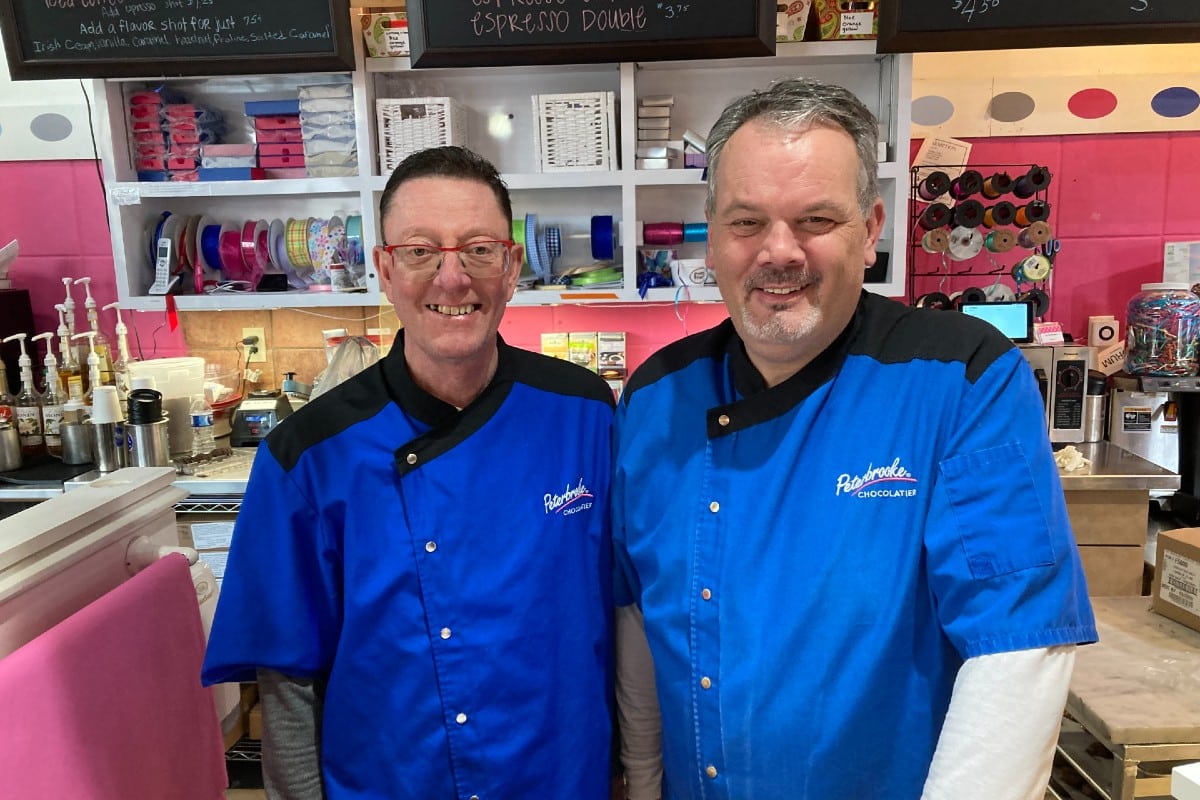
Peachtree Corners will soon lose one of its most iconic, popular and tasty businesses.
Peterbrooke Chocolatier, run by Geoffrey Wilson and Scott Gottuso, has been told by Peachtree Forum landlords, North American Properties and Nuveen Real Estate, that its lease will not be renewed. The last day of business will be July 25.
Meanwhile, Peachtree Forum is getting several new stores. They include Kendra Scott, Sucre, and The NOW Massage. Previously announced were Alloy Personal Training, Cookie Fix, Gallery Anderson Smith, Giulia, Lovesac, Nando’s Peri-Peri and Stretchlab. Wilson adds: “We are not in their big picture.”
Wilson has operated Peterbrooke at the Peachtree Forum for 14 years and Gottuso has been there nine years. They have made the chocolatier profitable and doubled sales. Wilson says: “We turned it around through community involvement and made relationships. We worked with the schools, gave donations, did a lot in the community, and made a difference. We produce most everything we sell in the shop, so it’s labor intensive. We make European-style chocolate treats from scratch from the very best ingredients, package it, make gift baskets, and also sell a lot of gelato.”
Key items include truffles, hand-made caramels, cherry cordials, chocolate-covered cookies and pretzels and strawberries hand-dipped in their own blend of chocolates. (They are all good!) One of Wilson’s and Gottuso’s most iconic products is chocolate popcorn. Once you try it, regular popcorn is tasteless. “We sell a lot of it.” Wilson adds: “Gelato sales have carried us in the summertime, since there are not many chocolate holidays in the summer.”
Peterbrooke now has five employees, and would like to have 10, but it is difficult to hire people with the skills in chocolatiering. A key part of its business is corporate companies, such as Delta Air Lines and Capital Insight. The Peachtree Corners’ Peterbrooke has corporate customers as far away as Cleveland, Ohio.
The operators were surprised when the Forum owners did not renew its five year lease. “The big decisions were made in Charlotte or Cincinnati, not locally,” Wilson feels. “We were no longer in their big picture. They want new and glitzy, shiny, fancy and trendy.”
The operators plan to start their own chocolate company, to be called “Scoffrey,” and initially sell online, plus have pop-up locations during holidays, and possibly have a booth in other merchants’ stores on occasions.
“Whatever we do would look different. We might rent a space somewhere close by so that people can still have the good chocolate experience with us, but we won’t have a regular audience walking by.”
Another element: the price of chocolate futures has spiked this year, with a bad crop production year. Wilson says: “That is key to our business and a huge cost increase. That doesn’t help.”
Wilson adds that the forced closing of the Peterbrooke location “is something like the death of a friend. But you go to the funeral and to the wake, and in six months or a year, It won’t be so bad.”
Have a comment? Send to: elliott@elliottbrack
Written by Elliott Brack
This material is presented with permission from Elliott Brack’s GwinnettForum, an online site published Tuesdays and Fridays. To become better informed about Gwinnett, subscribe (at no cost) at GwinnettForum
Related
Community
The Transformative Trail: Dr. Sunit Singhal’s Journey to Wellness
Published
3 weeks agoon
April 1, 2024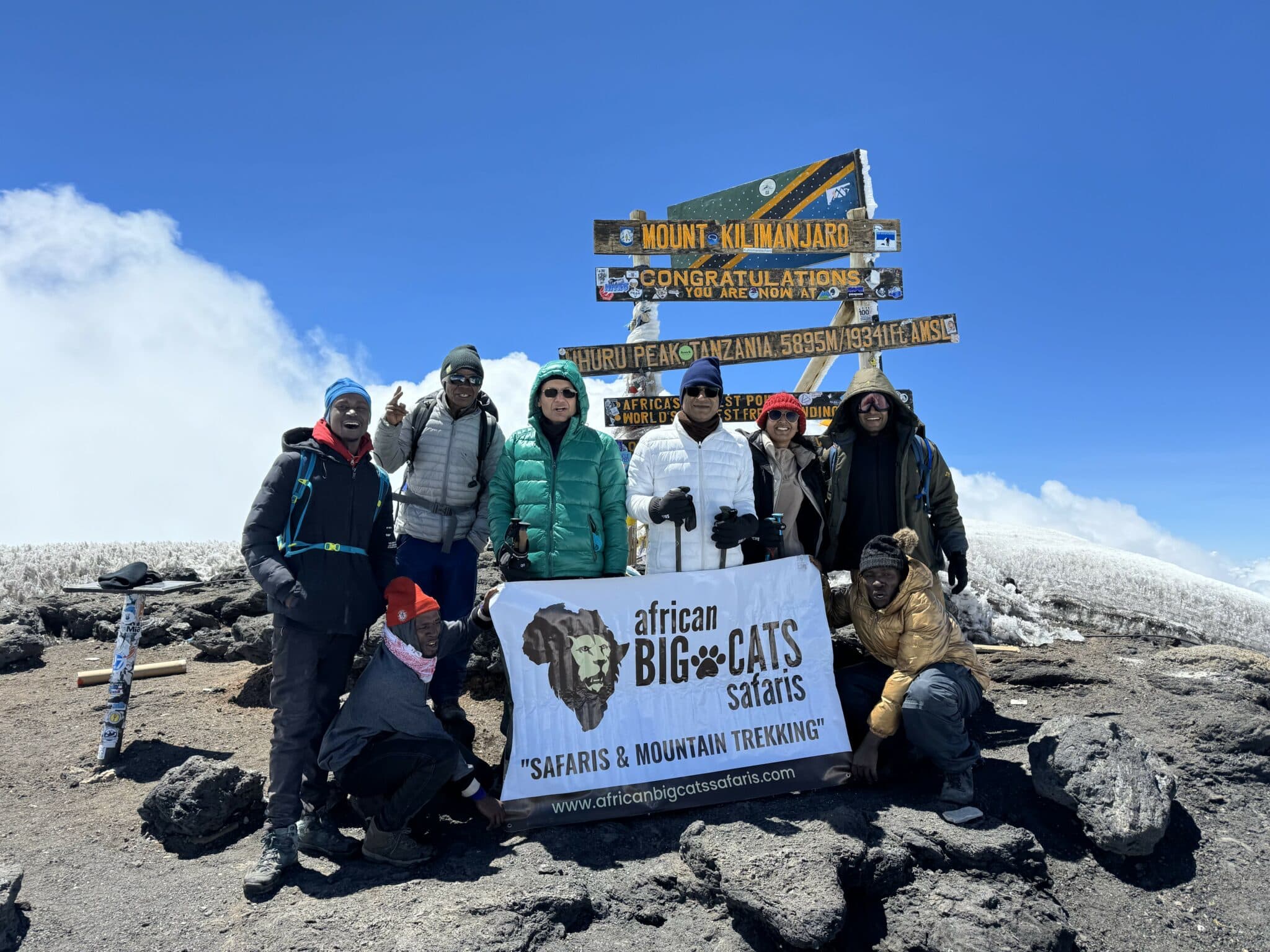
For more than two decades, Dr. Sunit Singhal has been a member of the Peachtree Corners community. In February 2001, he opened Suburban Medical Center, making a significant contribution to community healthcare. Under his leadership, the medical center has expanded, notably by introducing Suburban Med Spa next door.
A 1988 graduate of the University College of Medical Sciences in New Delhi, India, Dr. Singhal furthered his expertise in the United States, completing his residency in Internal Medicine at Harlem Hospital Center in New York.
An awakening at the Grand Canyon
A few years ago, the 60-year-old physician had an eye-opening moment about his own health. Most of his life was spent being overweight, which he accepted and managed the best he could.
“It’s not a secret that I was overweight. Anyone could see it; it’s how I was my whole life,” said Dr. Singhal.
The pivotal moment for Dr. Singhal was his attempt to join friends on a hike at the Grand Canyon a few years back. Despite his determination, Dr. Singhal was unprepared for the hike’s demands.
“I thought, okay, I will meet my friends one-third of the way down the canyon from the opposite end. That way, I can keep up with them towards the end of the hike,” he shared.
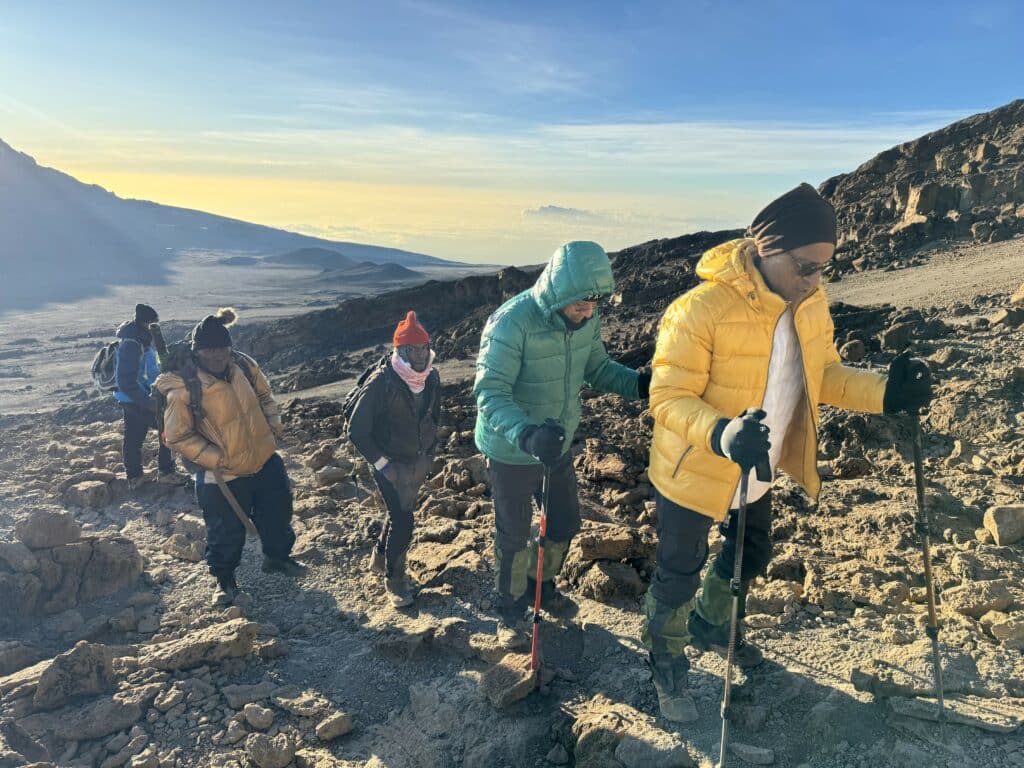
Even starting much later, Dr. Singhal struggled greatly with the hike. He experienced knee pain, breathlessness, and exhaustion. His struggle not only slowed him down but also his friends, who had been hiking for an additional 12 hours before he joined them.
The ordeal ended in the middle of a cold night, leading to a physically taxing recovery period that left Dr. Singhal sore for days.
Despite the arduous experience at the Grand Canyon, Dr. Singhal didn’t retire his hiking boots. Feeling motivated to conquer the obstacle, he began walking long miles with friends to get into shape.
A few months later, the call of the canyon echoed again, and friends proposed a new challenge: hiking from the South Rim to the river and back. While less daunting than their previous endeavor, the task was intimidating.
“This time, I was able to make the hike without holding anyone back,” he shared. Dr. Singhal already saw the difference his efforts were making.
His triumphs over physical and mental barriers were clear and exciting. Dr. Singhal’s return to the canyon increased his resilience and personal growth.
Conquering Kilimanjaro: a test of determination
Following a series of hikes through the Grand Canyon as his health improved, Dr. Singhal and his hiking group set their sights on Mount Kilimanjaro. They regularly engaged in 10-mile hikes each week to prepare for the trek.
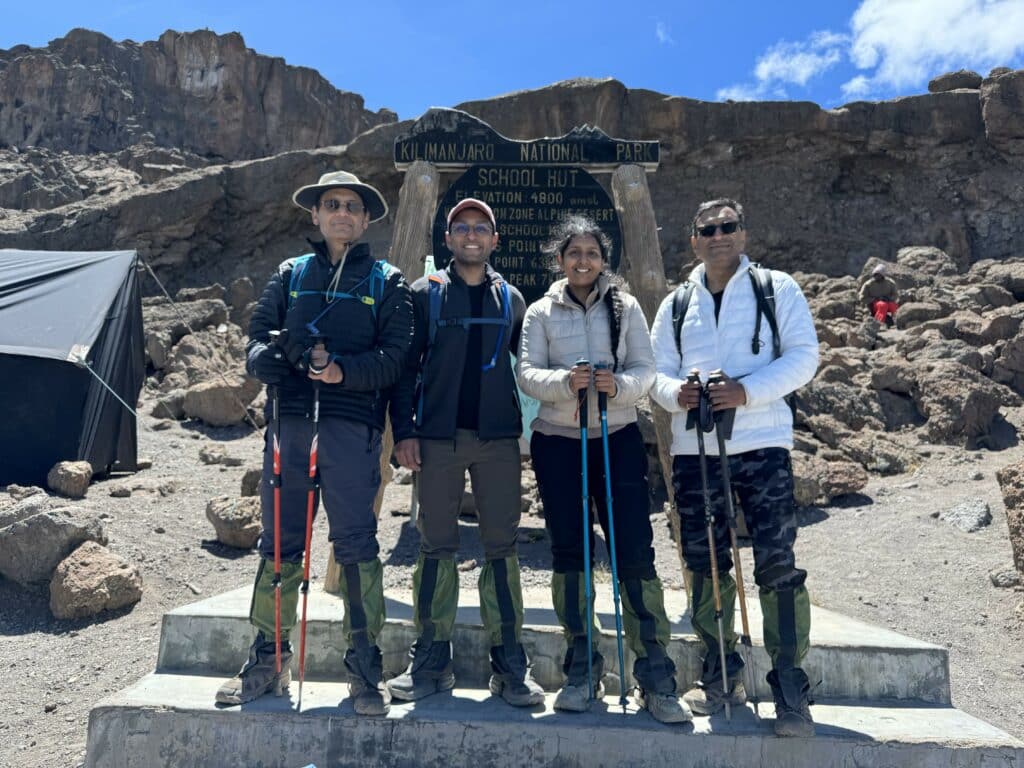
“It was never on our minds to simply skip or cut the hike short because we didn’t feel like it that day,” Dr. Singhal said. Even family members occasionally joined, keeping pace with the senior group with varying success.
When the time arrived for their Kilimanjaro quest, they needed to identify the number of days their group would need to complete it.
“There are different levels you can choose for hikes. If you are very athletic, the 5-day hike is for you. It goes all the way up to 9 days if you need to go slowly,” Dr. Singhal explained.
The friends chose the six-day option. It seemed like a good balance of their confidence in their fitness coupled with a conservative approach. Yet, they completed the ascent in five days.
“We couldn’t believe we finished at such a quick pace. We weren’t straining ourselves to do it. It was the natural pace we wanted to go, and we finished with the group we viewed as the most fit and athletic.”
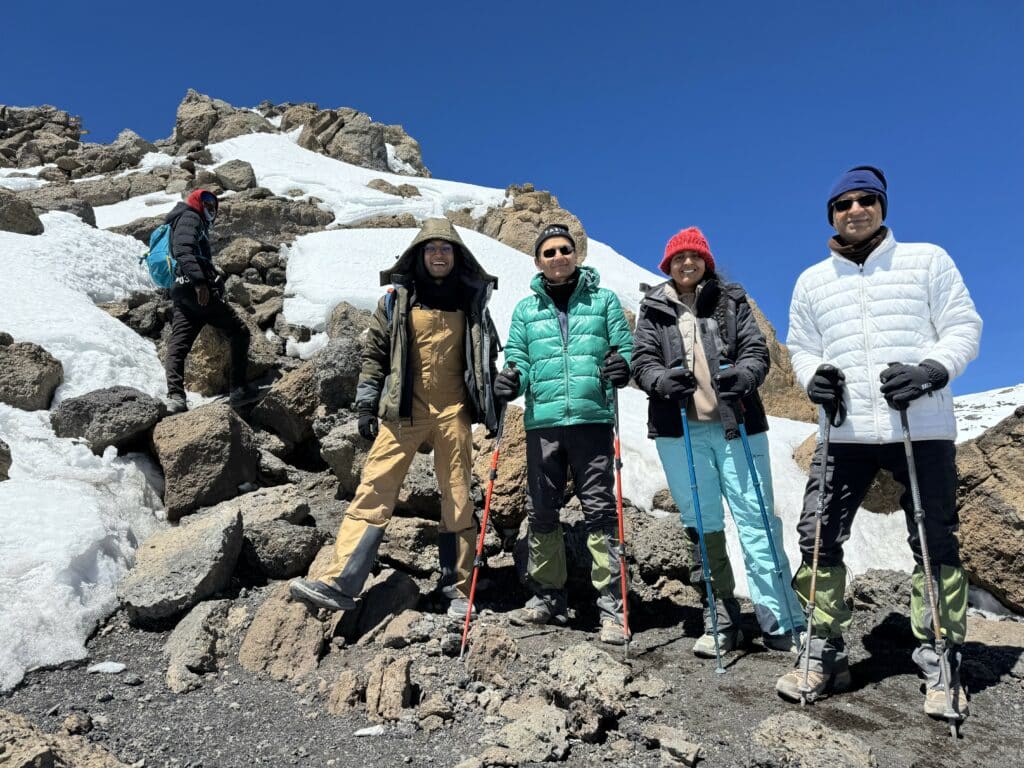
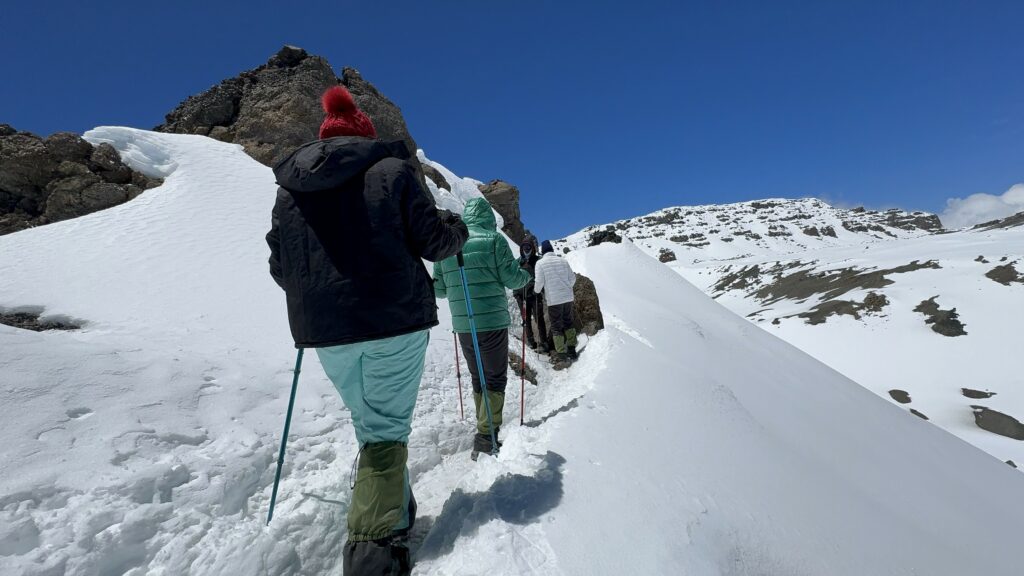
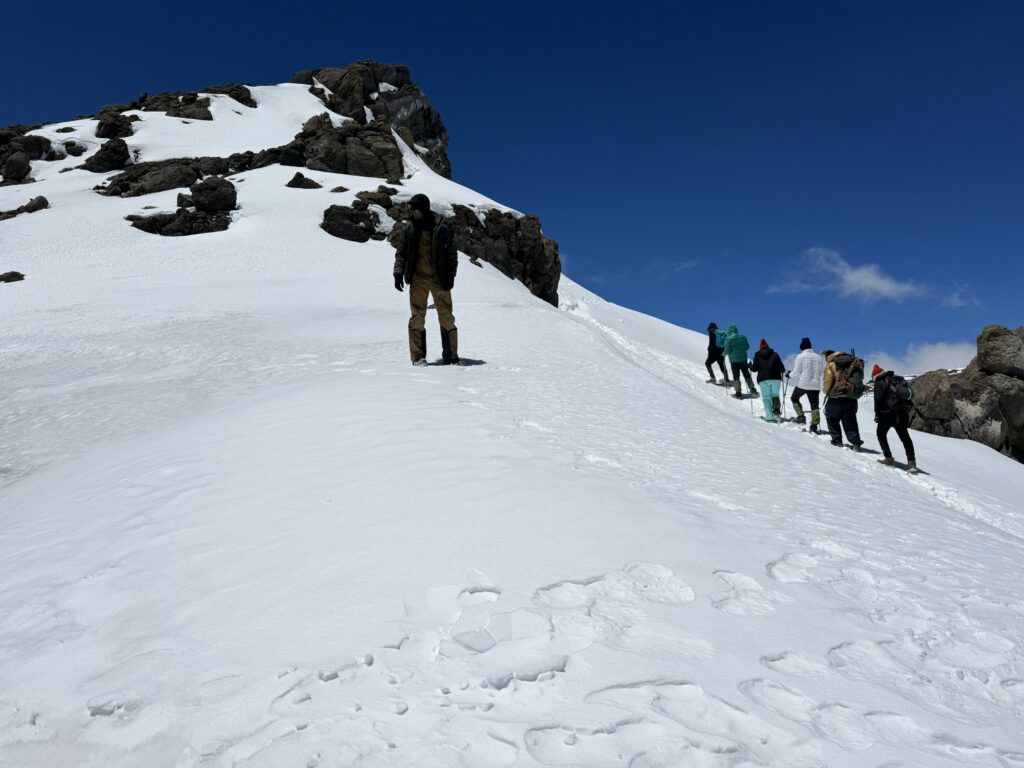
Mount Everest on the horizon
The hiking group isn’t resting on their laurels, though. The crew continues to meet and train for their next goal, climbing Mount Everest.
“There’s a lottery to be accepted to climb. We entered and are hoping to be selected for a hike this fall,” Dr. Singhal shared. When asked if he felt intimidated about this potential hike, he confidently replied, “No, not really.”
The team of friends will hear this summer if they are selected to climb.
Health and hope
Dr. Singhal’s health journey is the perfect example of the potential for change at any stage of life. It also highlights the importance of self-care, perseverance and pursuing one’s goals, regardless of the starting point.
His patients can rest easily. He isn’t walking away from his practice for the mountains full-time. Dr. Singhal is committed to his practice and patients. He firmly believes and displays that personal improvement and professional dedication can coexist harmoniously.
“I want my patients to know that I am equally dedicated to being here for them and their own health journeys.” When he’s not hitting the trails, Dr. Singhal can be found spending time with his family in Duluth or at his practice in Peachtree Corners.
Related
Community
Local Youngsters Learn Life Lessons Through Community Service
Published
3 weeks agoon
March 31, 2024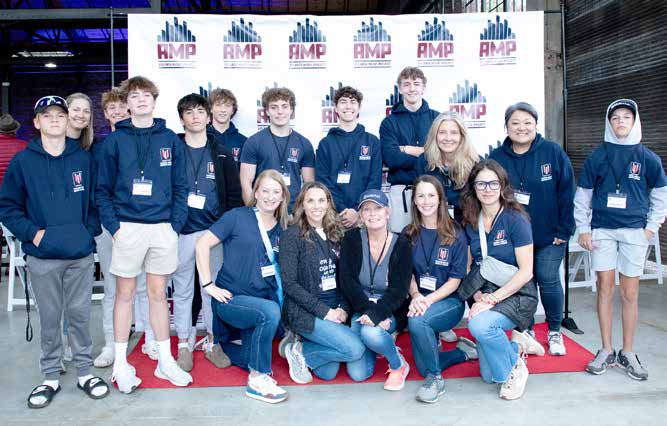
What started 20 years ago with two Texas moms looking for ways to get their sons involved in community service projects while spending quality time together turned into the Young Men’s Service League (YSML).
The national organization has dozens of chapters in 20 states, including Georgia.
Peachtree Corners mom, Heather Fleming, heard of a chapter in the northeast part of metro Atlanta, but it was pretty much at capacity.
“The way the chapters work is each class can only have around 30 boys,” she said.
“The more people you have in your chapter, the harder it might be for people to get hours in and just managing that number of people [can be difficult],” she added.
Taking matters into her own hands
Fleming partnered with another mom whose son couldn’t get into the chapter either to start their own.
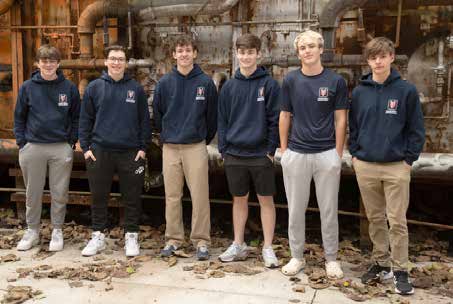
“She was determined that she wanted her boys to be able to have this experience,” said Fleming.
“Our chapter started with a full ninth-grade class , and then the tenth-grade class was a little bit smaller, with around 20 boys,” she added.
Even though it’s a good way for public school students to earn community service hours, most of the participants attend private schools that don’t have that requirement.
They do it to do good in the community and to have fun hanging out with their moms.
“The whole point is that we only have four years left before our sons go off to whatever their next step is after they graduate from high school,” said Fleming.
“It’s just to have that quality time together, serving the community and then also to give them the opportunity to hear from speakers they would not ever necessarily have access to,” she added.
Preparing the next generation
Fleming’s son Luke graduates next year and he’s found fulfillment in YMSL.
“It has been fun serving our community with many of my friends and their moms. I have also learned a lot from the various speakers we have had over the years,” said Luke. One of my favorite speakers was Tyler Hannel, who spoke about how to be a better version of yourself.”
There are many charities that need volunteers, and many align with the skills and interests of the young men.
“My most memorable experiences were serving with BlazeSports at their annual Big Peach Slam basketball tournament the last two years,” said Luke.
“Watching kids my age play basketball from a wheelchair was so inspiring. I am thankful for an organization like BlazeSports that gives kids and adults with disabilities a way to still compete in a variety of sporting events,” he stated.
Tracey Shell and her son, Carson, have similar views.
“Our first year was last year, so I didn’t know about this organization when my older son was in high school,” said Shell. “They learn about things like life skills and leadership, … but the real heart of the organization is volunteering in your community and learning about local philanthropy.”
Each YMSL chapter works with a certain number of nonprofits each year—usually nearby. Although this chapter is called the John’s Creek Young Men Service League, it has members from Peachtree Corners, Norcross, Berkeley Lake, Alpharetta and John’s Creek.
YMSL donates time and energy, not money
Every year, each chapter does what it calls the ultimate gift. This time around, the Johns Creek chapter went farther outside its boundaries and helped the Atlanta Music Project (AMP). It’s a nonprofit organization founded in 2010 to provide tuition-free world-class music training and performance opportunities in under-resourced communities.
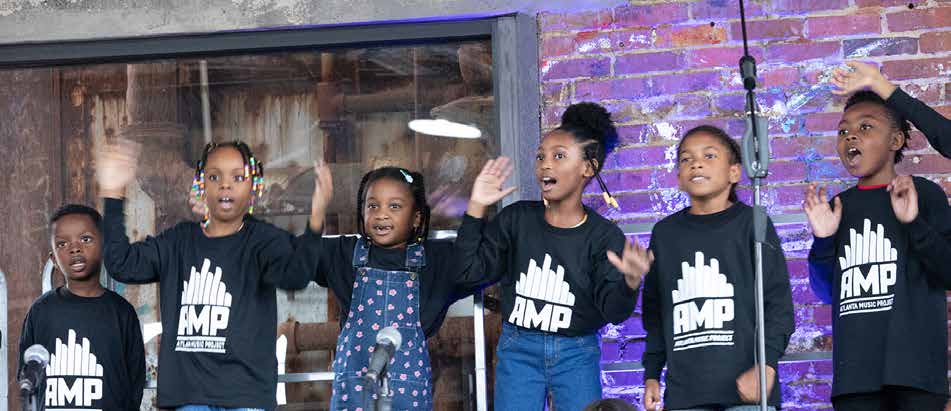
In October, AMP presented its first event, which brought together its entire community of performers for an afternoon of music and fellowship. The AMP Experience took place at Pullman Yards and featured performances from past and present students, with about 500 participants in total.
To pull off such a feat, AMP needed many volunteer ushers and stage crew. That’s where Johns Creek YMSL stepped in, with nearly 80 local YMSL volunteers who gave 246 service hours. Mom and son volunteers loaded instruments, set up and cleaned up, served as parking lot attendants and greeters and supported social media outreach.
Both Fleming and Shell have seen their boys grow and mature and are proud of the young men they are becoming.
“They become more aware of the different nonprofits and philanthropy that are just right in our own backyard that they might not have known about,” said Shell.
Fleming echoed that sentiment. Her older son Andrew is a sophomore at Clemson University, and she’s seen him carry the lessons learned at YMSL into his daily life by being actively involved with service projects in his fraternity and a mission trip over Spring Break.
“He definitely has a heart for helping others, which … is the ultimate goal. When they’re not living at home, and I’m not necessarily making them serve, they want to do this on their own in college and beyond,” she said.
For more information, visit ymsljohnscreek.org.
Related
Read the Digital Edition
Subscribe
Keep Up With Peachtree Corners News
Join our mailing list to receive the latest news and updates from our team.
You have Successfully Subscribed!

April/May Events Going on at Gwinnett County Parks

8 Theatrical Performances Coming to the Peachtree Corners Area

Enter Our Readers’ Choice Awards 2024

North American Properties Secures 3 New Brands for The Forum

Georgia United Methodist Foundation Announces Changes to Finance Team

North American Properties Revitalizes Avenue East Cobb

Exploring Israeli Innovation in the Smart City Sector with Einav Gabbay [Podcast]

BRACK: Peachtree Corners to lose Peterbrooke Chocolatier

BRACK: Peachtree Corners to lose Peterbrooke Chocolatier

Georgia United Methodist Foundation Announces Changes to Finance Team

North American Properties Revitalizes Avenue East Cobb

Exploring Israeli Innovation in the Smart City Sector with Einav Gabbay [Podcast]

North American Properties Secures 3 New Brands for The Forum

April/May Events Going on at Gwinnett County Parks

8 Theatrical Performances Coming to the Peachtree Corners Area

Enter Our Readers’ Choice Awards 2024

Light up the Corners [Video]

Capitalist Sage: Business Leadership in Your Community [Podcast]

Cliff Bramble: A Culinary Adventure through Italy

Top 10 Brunch Places in Gwinnett County

A Hunger for Hospitality

THE CORNERS EPISODE 3 – BLAXICAN PART 1

Top 10 Indoor Things To Do This Winter

The ED Hour: What it takes to Remove Barriers from Education
Peachtree Corners Life
Topics and Categories
Trending
-
Parks & Recreation1 week ago
April/May Events Going on at Gwinnett County Parks
-
Arts & Literature1 week ago
8 Theatrical Performances Coming to the Peachtree Corners Area
-
Readers' Choice Awards1 week ago
Enter Our Readers’ Choice Awards 2024
-
Business1 week ago
North American Properties Secures 3 New Brands for The Forum




